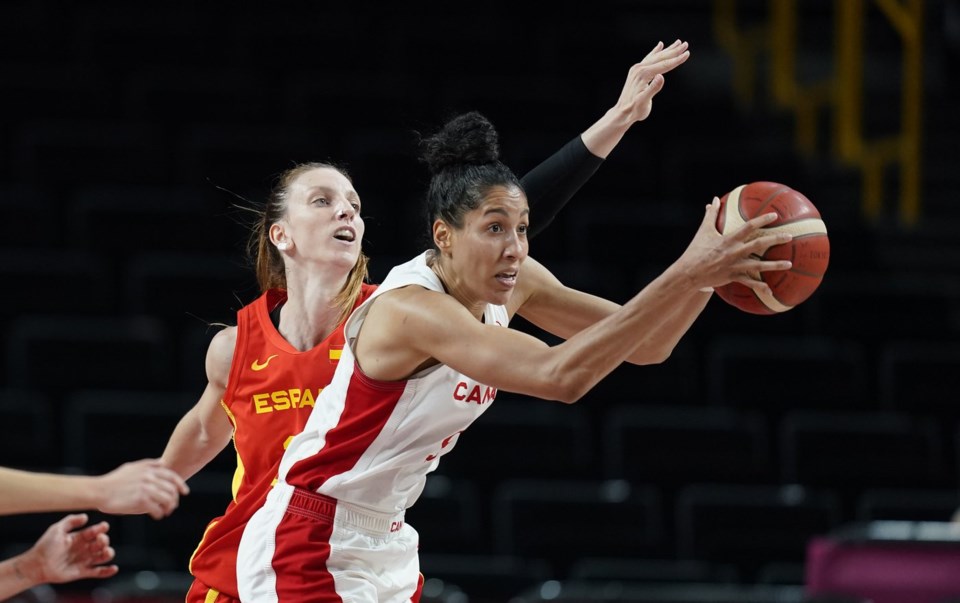As two of Canada's most experienced Olympians, Miranda Ayim and Erica Wiebe have made careers out of playing sports at the highest levels of competition.
But some of their most formative memories are of playing as children with almost no stakes.
"We basically would have a neighbourhood-wide game of tag where we were just jumping fences from yard to yard," said Ayim, who was on Canada's women's basketball team at four Olympics.
"I don't know if our parents really appreciated that, but we felt so adventurous going from yard to yard and running but still feeling safe to do so in that neighbourhood, and enjoying that time and that feeling of freedom."
For Wiebe, who won gold in women's wrestling at the 2016 Rio Olympics, one of her fondest memories is of instantly clicking with teammates in her first match with a new youth soccer team.
"We started the game with the ball, the whistle blows, and we went tic-tac-toe and just passed back and forth up the field, and it ended with me passing to my teammate and she scored," said Wiebe in a recent phone interview. "It was just this joyous moment where everything just fit together.
"It was maybe my first, earliest, flow state experience."
Ayim and Wiebe are two of Right To Play International's Canadian ambassadors, encouraging people to participate in the United Nations' International Day of Play on Wednesday. The aim of the day is to celebrate the power of play in children's lives, and encourage parents to guide their children back into the kind of experiences Ayim and Wiebe still cherish.
"You don't realize that you are missing it until you become an adult, but that kind of taps on the importance of Right To Play," said Ayim. "When I think back on that feeling of freedom and safety, Right To Play is providing that for a lot of children."
Based in Toronto, Right To Play International has worked for 25 years to protect, educate, and empower children to rise above adversity through the power of play. The charity says that play is in sharp decline because of shrinking access to public play spaces, rising screen time, and academic pressure.
Right to Play's Ellen Fesseha says that's a concern because play doesn't just give children a social outlet, it teaches them life skills.
"It's developmentally appropriate, meaning it really meets children at the level that they're at, the active skills that they have at whatever point they're at in their development," saud Fesseha, a play specialist at the organization.
"It allows them to to engage in meaningful ways, to actively participate, to explore the world around them, and then beyond that, it really allows children to take a step further in what they can do. It really pushes them beyond their limit, and allows them to continue to build skills."
According to UNICEF, around one in five children between the ages of two and four do not play with their caregivers at home. Right To Play argues that "disappearing play" is not just a parenting issue, it’s a public health, education, and equity issue, especially in underserved communities where access to safe, free play is limited or non-existent.
"We focus on education, on learning outcomes. We focus on reaching children in hard to reach places. We focus on helping children through trauma, through crises," said Susan McIsaac, Right To Play International's president and chief executive officer. "Play is the instrument that allowed us to reach children, to help empower children, to help children learn.
"That is why we wanted to acknowledge play as an important tool in the world, and it's why the International Day of Play will be a big day of celebration for all of us at Right To Play."
McIsaac hopes that Canadians will participate in the International Day of Play on Wednesday by doing at least one of three things.
The first is simple: just play. Play with the children in their lives or with friends and colleagues and share that experience, tagging Right To Play on social media.
Second, McIsaac hopes that people will follow Ayim and Wiebe's lead by sharing stories online of joyful play from their childhoods with the hashtag PlayChangesEverything.
Finally, Right To Play will accept donations through its website.
"We're hoping that they'll do that, build awareness, support, financially, get out there and play and tell people about it," said McIsaac.
This report by The Canadian Press was first published June 10, 2025.
John Chidley-Hill, The Canadian Press



